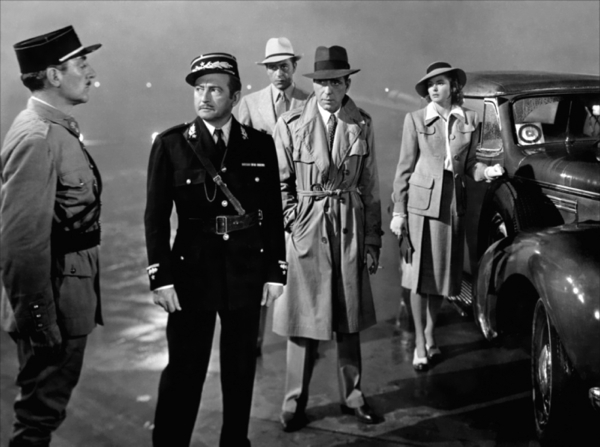Interview by Greg Carlson
From November 10 through November 14, 2002, the Fargo Theatre will screen a series of five classic Hollywood motion pictures honoring the veterans of WW2.
The films include “Casablanca,” “From Here to Eternity,” “Twelve O’Clock High,” The Bridge on the River Kwai,” and “Patton.” All shows will be introduced by film critic and historian Tony McRae.
The High Plains Reader’s Greg Carlson talked with McRae about the film series.
GC: Tell us a little bit about the genesis of this series.
Tony McRae: In early 2001, I realized that the 60th anniversary of WW2 was nearly upon us, and that many of those who lived through the period, both veterans and others, might not be around for the 70th or 75th anniversary.
If we were going to do something to honor these people, now was the time.
GC: What is it about WW2-themed movies that audiences find so compelling?
Tony McRae: There has been a tremendous interest in what we now call “The Greatest Generation.” Perhaps America has a need for a more black-and-white time, or at least what we think of as a time when there were clear-cut rights and wrongs.
This need was demonstrated after 9/11 when we honored those firefighters and police who gave their lives to help others.
GC: The films are organized in such a way as to cover the length of the war, as well as a variety of important historical events. It is interesting to me that “Casablanca” was made while the war was taking place.
Tony McRae: “Casablanca” had its genesis before we entered the war, when many Americans didn’t want us to get involved in Europe’s problems. Of course, Pearl Harbor changed all that, so “Casablanca” became a testimony of sorts to those like Rick Blaine who entered the war reluctantly.
Hollywood got behind the war effort with everything it had, and rushed out topical movies to boost morale. It was surprising in many ways that so many good movies were made.
There was a lot of racism at the time, with the Nazis and Japanese demonized and vilified. At the time this was perfectly acceptable.
GC: Were there any films that you wanted for the series but were unable to get?
Tony McRae: I was hoping for “The Story of G.I. Joe” and “The Best Years of Our Lives,” but they were unavailable. The first is a combat film, the second the most vivid picture of what post-war life for returning veterans and their families was like.
Still, we have a great line-up that will take us from before America entered the war to the end of the war and the coming peace. The movies we’ll screen are not combat movies per se, especially “Casablanca” and “From Here to Eternity,” both of which give a sense of pre-war America’s thinking.
GC: What is your own favorite WW2 movie?
Tony McRae: “Casablanca” is my favorite movie, period. Permit me to quote from my film site: I was shaped by the war, and, frankly, by Hollywood’s portrayal of it. Nostalgia has a persuasive force, yet I cannot be persuaded that it alone is capable of holding me for these many years.
GC: The focus of the series is to honor the veterans of WW2. Talk a little bit about the importance of what the men and women of that generation accomplished.
Tony McRae: Wow! That’s too much for me. I remember so clearly young men going off to war and coming home on furloughs, their uniforms so spiffy, and then I’d go to the College, the movie house in College Point in Queens, and see the Movietone newsreels and battle movies with John Wayne, Dana Andrews, Robert Montgomery, and I couldn’t help putting those young men from my home town into those movies. They were my heroes.
